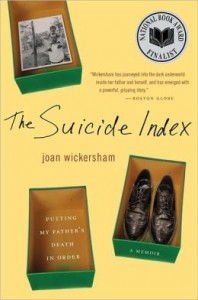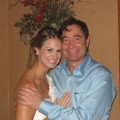
I recently bought several books related to suicide and depression and the first one I started reading was The Suicide Index by Joan Wickersham. It’s a great book—an “index” of everything related to her father’s suicide and her methodical process of trying to figure out his story and the reasons that made him end his life. She details the day of—from her dropping her son off at her in-laws, to how she’ll feel about seeing her Mom, to the emotions everyone has, as well as detailing past experiences in her Dad’s life and his relationships with people. All those details that you go through in your head to come up with some conclusion as to how someone you loved could take their life.
Suicide Index by Joan Wickersham. It’s a great book—an “index” of everything related to her father’s suicide and her methodical process of trying to figure out his story and the reasons that made him end his life. She details the day of—from her dropping her son off at her in-laws, to how she’ll feel about seeing her Mom, to the emotions everyone has, as well as detailing past experiences in her Dad’s life and his relationships with people. All those details that you go through in your head to come up with some conclusion as to how someone you loved could take their life.
“This is what I do know, or what I believe. When someone dies this way, you’re left with unanswerable questions, unresolvable paradoxes. You have to become a posthumous mind reader. You have to look at the things you know, those small, possibly unreliable and often contradictory scraps of memory, and come up with your own version of the truth.” (pg. 42)
The above quote basically sums up the entire book, and probably how we all feel after losing someone to suicide. I know for me, someone recently mentioned to me that my Dad played rugby in college…rugby players don’t wear helmets…lots of pro football players’ suicides are now being related to the brain trauma caused by years of repeated concussions…maybe my Dad’s mental illness could be related to his years of playing rugby without a helmet. That’s just one of the routes my mind goes when I try to piece my Dad’s suicide together, and Joan does that in a systematic way in her book. I feel “normal” after reading her account—I know I’m not the only one who wanted to know every little detail leading up to the suicide and then try to backtrack years of someone’s life.
“I might figure out all the reasons and add them up, but I still wouldn’t get the answer my father had gotten when he’d done the same piece of math. What was it about him that made him add up the reasons and come up with dying as the right answer? Had he been adding up reasons? Was it possible to arrange rational causes in a column and arrive at an irrational result? Was his death a rational act, or an irrational one? Was his suicide a decision he made, or a force beyond his power to control? Did he have a choice?” (pg. 69)
I think this highlights another huge aspect that we as survivors deal with. Was this a rational decision? How long did my Dad think about suicide? I know for my situation, I believe my Dad had the thought about suicide for several weeks. I found a document that had family information on it (account numbers, phone numbers of his lawyer/etc, passwords). It was a document he kept in an envelope in his top dresser drawer. On the envelope it said “If anything ever happens to Dad.” I’ve known about this envelope for years. After my Mom died (3 years and 1 month before my Dad’s suicide), he updated bank accounts so my brother and I were on them, and told me about this letter. It made sense as my Mom’s death was sudden. Why I think he had been thinking of suicide at least a few weeks before he died was this letter was updated July 17 2011, and he died July 27th. I am only comforted in the fact that with that information I know his suicide wasn’t a split second decision. It was something that was floating in his head for several weeks.
I often wish I knew what my Dad’s face looked like before that. Was he upset? Was he relieved with what he knew was going to happen, that all his pain would end soon? I think back to one of the last times I saw him, which I believe was July 7th. My Dad met me for lunch, and he just looked SO SAD. He had recently broken up with his girlfriend, so I thought his sadness and mood change was from being upset about the breakup. Now I know it was so much more. I vividly remember how sad and bummed out he looked-his face looked tired and his eyes were not his own. I had just returned from a vacation to Alaska, and he barely cared that one of the souvenirs I gave him was a small container of moose poop. I often think that he had that same expression on his face and in his eyes the evening he decided to end his life.
One of the last chapters is about the act itself and how irreversible it is. One of the emotions I struggled with the most and what kept me awake at night and caused me nightmares, was thinking if my Dad regretted what he did. Is he up in Heaven wishing he didn’t do it? (Can you think in Heaven? Can you reflect on the life you had?) I’ve had several dreams with my Dad in them and in each dream I am yelling at him: “Do you regret it?” Those dreams have faded but I often wonder what it’s going to be like when I see my Dad again. Will I ever get to know? Or when we get to heaven does it even matter anymore?
Back to the book…I would highly recommend it. It’s comforting to read someone else talk about their father’s suicide from all angles. I know, I never get bored listening to Becky or Jessica talk about their father’s life and anything that could be associated with their suicide, because I know it’s a thought that’s always on my mind. It feels good to lay out all the facts and have someone else seem interested in it. We’ll never know the answers, so it’s hard not to always go back and re-analyze new information or tidbits that might put the puzzle pieces together. I felt that as I was reading this book I was having a conversation with the author. They were topics I’ve discussed with Becky and Jessica, with my brother, and with others at my bereavement meetings.
One last thought on books: Right after my Dad’s death (the first month after his death) I started to read books relating to suicide. I couldn’t handle it—it would make me cry more and I couldn’t sleep. I brought this up to my counselor, and we realized I wasn’t ready to be reading books about suicide. It probably took about a year after my Dad’s death before I was in a place where I could read and it would benefit my well-being and my grief process. Not sure if any of you have felt that way, but if you read (or really do anything that you think is helping your grief), and it’s doing the opposite, maybe it’s not working for you at that moment. I know for me I couldn’t write or journal after my Dad’s death. I just couldn’t put down how I was feeling so I didn’t do it. Everyone’s different with what helps them at different points in their grief journey. Just become something works for one person doesn’t mean it’ll work for you. Or maybe it will, just at a different point in the grief journey.
Please let me know if any of you have read The Suicide Index and what you thought. Have you read any other books you’d recommend?



